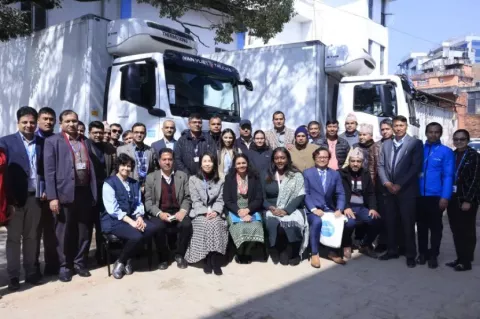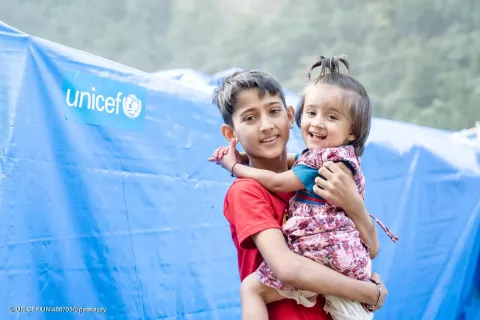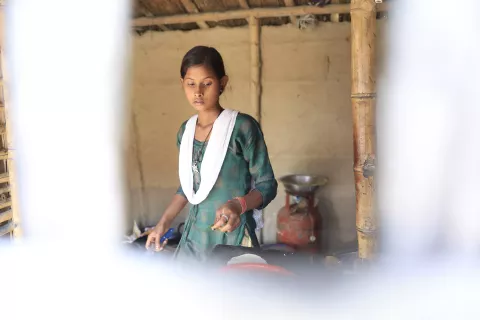Managing mental health amidst COVID-19
Over 100 young UN volunteers participate in a discussion about the impact of COVID-19 on their mental health and ways of coping

Kathmandu, Nepal - “I was getting anxious using too much social media, so I deactivated my Facebook account,” said Anu Poudel, recalling the overwhelming volume of posts that had poured out on her social media after the COVID-19 pandemic began.

Many of these posts comprised fake news and rumours. Instead of being affected by these worrying posts, she decided to spend her time taking an online course, meditating and planning her career.
Ms Poudel, who lives in Jhapa District in eastern Nepal, shared this during a recent webinar for young UN volunteers on mental health and well-being conducted jointly by UNICEF, UNV, WHO, UNDP and the Resident Coordinator’s Office in Nepal. The webinar brought together over 100 youth volunteers from all seven provinces in the country.
Activist and volunteer Sudip Gautam highlighted the particular social, emotional and economic toll that the crisis is taking on members of the LGBTIQ community, many of whom are daily wage workers and artists. He also explained that many community members who are on Antiretroviral Therapy (ART) or other kinds of hormone therapy have not been able to go to hospitals and are therefore suffering the consequences: from severe headaches, mood swings and stress – to suicidal thoughts.

“The marginalization of the LGBTIQ community is worse during the lockdown,” he said.
Another volunteer, psychology student Nir Shrestha, who is visually impaired himself, touched on the difficulties faced by people with disabilities. But he said he was determined to stay positive.
“The lockdown has created challenges as we have to maintain physical distance, but possibilities to increase our intellectual capability has not been hampered,” he said.
Mr. Shrestha talked about how he is taking different online classes to build his skills as well as collaborating with various organizations that are providing relief to people with disabilities.
“My message to people is to stay in present and make your present the best experience despite everything,” he added.

Ms. Poudel, Mr. Gautam and Mr. Shrestha are all part of #V4ACTION, a volunteer initiative launched by the United Nations agencies to engage young people nationwide via digital platforms in spreading preventive messages and actions in their networks and communities during the COVID-19 period.
Given the many uncertainties that the crisis has brought on, and the potential effect of the stress and anxiety on young people’s mental health, the webinar was aimed at providing these volunteers with a platform to openly discuss their experiences and challenges as well as receive information from mental health experts including WHO’s Dr. Kedar Marahatta. Participants were also joined by Ms. Valerie Julliand, United Nations Resident Coordinator and Mr. Man Bishwokarma, Joint Secretary, Nepal Government’s Ministry of Youth and Sports.
“Due to COVID-19 and the lockdown, young people are facing anxiety, tiredness, anger, but it is important to speak up, connect with others and know that you are not alone. Understanding what we are feeling is normal is the key to keeping ourselves safe,” Ms Julliand said to the participants.
Thanking them for their efforts, she added, “Young volunteers have been our ambassadors to fight rumors and convey useful messages to wider public, thus, we need you to stay healthy in this time of crisis.”
The volunteers have been regularly engaged in combating misinformation related to COVID-19 and using their voices and social media platforms to spread awareness about the disease. Through UNICEF’s mythbusting campaign targeted towards young people, the volunteers have been using their “superpowers” to report any rumors or misinformation they come across on social media or chat groups. More than 100 rumours and misinformation regarding COVID-19 have been submitted in the online rumour-tracking platform, thanks to the efforts of the volunteers. In addition, a number of the volunteers have also developed short videos in multiple languages, including on urging people to practice physical distancing as a way to stop the spread of the virus in their communities.
Currently, more than 300 young people from all over the country are engaged in the #V4ACTION volunteer initiative.




